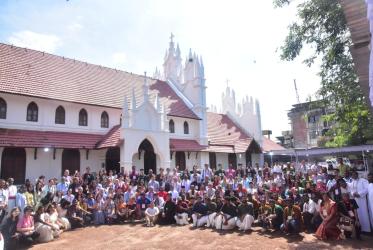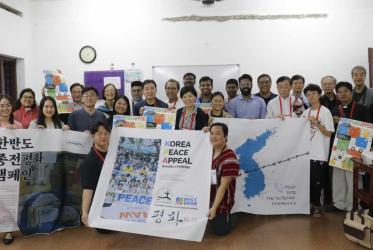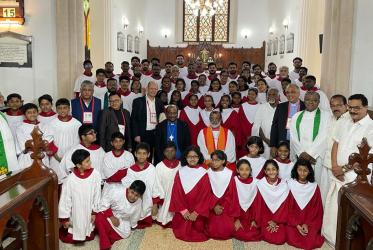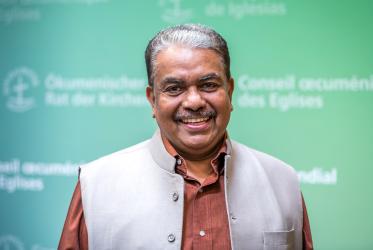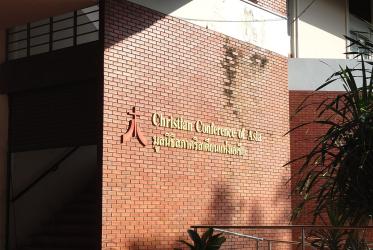Statement from EDAN Bangkok workshop
Ecumenical Agenda of Churches in Solidarity with Differently-Abled Persons
WORKSHOP STATEMENT
We, the 24 participants representing 8 national councils and ecumenical partners meeting under the auspices of Christian Conference of Asia and Ecumenical Disability Advocates Network (EDAN), World Council of Churches' Programme on Persons with Disabilities) on the theme, Ecumenical Agenda of Churches in Solidarity with Differently-Abled Persons at Royal Benja Hotel, Bangkok from 10-15 March, 2003, RECOGNISE:
- That 600 million Persons with Disabilities in the world is a challenge to reckon with;
- That Women with Disabilities are twice discriminated;
- That Persons with Disabilities reflect God's image;
- That it is the negative attitude of our societies that reduce Persons with Disabilities to objects of ridicule and pity; The Bible says: "Stop judging by mere appearances, and make a right judgment." John 7:24
- That society is insensitive to social needs and aspirations of Persons with Disabilities. This attitude mars their abilities and self-esteem;
- That Persons with Disabilities are often forced to live out of the conscious thinking of the society;
- That Persons with Disabilities have as much the right to be out in public as the others. While our cities spend millions on the most inane of things, they do very little to provide for the needs of the disabled citizens.
- That Persons with Disabilities are not facilitated to participate fully in the life of the society;
- That Church-related institutions in most cases are unable to provide meaningful employment to Persons with Disabilities;
- That presence of Persons with Disabilities is minimal in Church-related programmes and activities;
- That 'Accessibility' - a factor that affects all aspects of Persons with Disabilities demands serious concern;
- That proper medical treatment and care is in short supply for the disabled, who are images of deep despair;
- That what is done by the state and society is inadequate to address the socio-psycho and physical needs of such people;
- That there has been sincere efforts in developing legislation to safeguard the rights and facilities made available to persons with disabilities (which includes, broadly measures for prevention and early detection of disabilities, education, employment, social security, research and development, barrier-free access and preferences and facilities that are available to such persons and the action which needs to be taken to avoid any discrimination against persons with disabilities), but these are largely not implemented;
We AFFIRM our Christian mandate:
During His ministry, Christ was mindful of the need of those suffering in body, mind and Spirit. He reached out with compassion and provided not just physical healing, but wholeness, thus transforming their lives.
St. John's Gospel has this to say:
Here a great number of disabled people used to lie - the blind, the lame, the paralyzed
(- And they waited for the moving of the waters. From time to time an angel of the Lord would come down and stir up the waters. The first one into the pool after each such disturbance would be cured of whatever disease he had.) One who was there had been an invalid for thirty-eight years. When Jesus saw him lying there and learned that he had been in this condition for a long time, he asked him, "Do you want to get well?" "Sir," the invalid replied, "I have no-one to help me into the pool when the water is stirred. While I am trying to get in, someone else goes down ahead of me." Then Jesus said to him, "Get up! Pick up your mat and walk." At once the man was cured; he picked up his mat and walked. John 5:3-9
Jesus challenged the Jewish Law then by not just healing the invalid, but transforming his life. The story brings into focus the need for prompt action.
St. Paul's in his letter to the Corinthians says, " Nay, much more those members of the body, which seem to be feeble, are necessary. " (1 Corinthians 12:22), recognises the indispensability of Persons with Disabilities.
If "We are witnesses of everything Christ did ," Acts 10:39a, then we are duty bound to bring "life in all its fullness," to the marginalised and stigmatized disabled persons, who are deprived of social justice and equal opportunities in life.
It may even take the element of risk when it comes to witnessing Christ. It is about recognizing and addressing the problems of the Persons with Disabilities risking our comfort, status and life too! And that is what Christian living,' is all about.
We, therefore CHALLENGE the CCA and WCC to maintain disability on their ecumenical agenda, and do all they can to keep the concerns of the Persons with Disabilities in focus.
We, also CHALLENGE that Asian Churches should:
-
Recognise and focus on the abilities of the disabled persons in all social spheres; Then your light will break forth like the dawn, and your healing will quickly appear; then your righteousness will go before you, and the glory of the LORD will be your rear guard. Isaiah 58:8
-
Address disability concerns through integrated education, vocational training for self-employment and necessary medical assistance for mobility and meaningful existence.
-
Use appropriate forums including the pulpit to build awareness on positive attitude towards disability concerns, and involve all people to visible action;
-
Enable and promote public consensus on conducting disability audits of principle public building structures including church buildings on their accessibility;
-
Ensure full participation and active involvement of Persons with Disabilities in all Church-related programmes, thus bringing "life in all its fullness" ;
-
Organise inclusive solidarity march,' on important national and international days symbolising solidarity, integration and a celebration of disability, thus sensitizing communities and promoting self-esteem of those disabled;
-
Establish church stations to meet the various needs of persons with disabilities;
-
Establish resource centres, providing counselling programmes, vocational guidance, therapeutic and referral services of various nature to persons with different disabilities;
-
Recognise that integration depends on social interaction and cannot be achieved by doing things for the Persons with Disabilities but by doing things with them. It is crucial that discriminating practices are put aside as well as widespread aversion for Persons with Disabilities;
-
Strive for integration, which is the prime condition to live in a society with equal opportunities and equal rights;
-
Work towards inclusion,' and not exclusion'. Bring the disabled in the picture.
